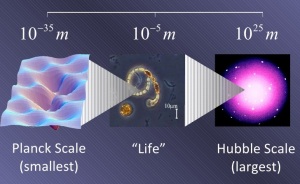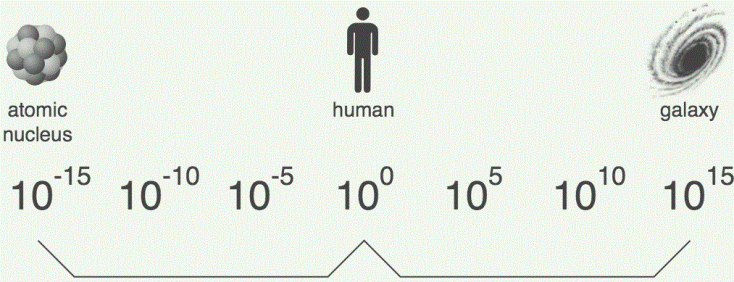If you’ve ever talked to an atheist about the purpose of life, at some point, the direction of the discussion takes a turn towards the vastness of the universe and the largeness of objects inside it. There are objects in the Universe that are a billion times larger than our Sun, and the size of the entire universe is infinitely large as well. In this scheme of sizes, our own size as a human being, or even the size of our little Earth, seems utterly insignificant. And so the atheist wonders, how can we have any significant purpose or meaning if our being is so unbelievably tiny in an unimaginably gigantic universe?
This is the very obvious and sensible reaction of anyone who can seriously grasp the true grandness of the universe we live in. However, the hugeness of the universe is just one side of the story. The other side of the story is the minuteness:
We do not just live alongside objects that are terrifyingly large, but we live alongside objects that are terrifyingly small, too!
Objects to which we, humans, are larger than the universe is large to us! (This means that the universe is not nearly as large to us as we are large to some objects in the universe, in comparison.) To understand this, we must grasp how small things can be.
THE PLANCK LENGTH:
The Planck length is the smallest measurement of length with any meaning. It is defined as the scale at which classical ideas about gravity and space-time cease to be valid and quantum effects dominate. It is roughly equal to 1.6 x 10-35 m or about 10-20 times the size of a proton.
This length is the scale at which the smallest particles, like electrons or photons, operate.* This length is unimaginably small; it is impossible for our minds to grasp or visualize this smallness. Even though we can grasp the grandness of large objects in the universe, we face extreme difficulty assimilating the smallness of things around us. This is because the human mind can not visualize smallness beyond a certain point, as we can’t see objects much smaller than the smallest we can see. Yet, we can understand this smallness by examples of similitude:
If a particle or dot about 0.005 mm in size (which is the same size as a small grain of silt) were magnified in size to be as large as the observable universe, then inside that universe-sized “dot”, the Planck length would be roughly the size of an actual 0.005 mm dot. In other words, a 0.005 mm dot is halfway between the Planck length and the size of the observable universe on a logarithmic scale.

What this means is that if you have a Planck-length object on one hand of the scale and the observable universe on the other hand of the scale (and if we range objects according to their size), then on this scale, a grain of silt will be located in the midst. That is, it will have an average size – which is quite contrary to how we actually visualize a grain of silt: really small, we classify it among the smallest things we can think of but the reality tells us differently: It has an average size when measured against all the things in the universe!
So what about us? Obviously, we are larger than a grain of silt. That makes us larger than average in size compared to all the things in the universe! This really changes how we see the universe and ourselves. Only by understanding and realizing how small things around us are can we realize how truly big we are. For an electron, a human being is as large as the universe is large to us. Not only this, but we ourselves are a universe for billions of atoms and molecules.

However, all of this talk about sizes and proving our size to be larger than we realize do not really make an argument for our significance. Even if we were as large as the Betelgeuse or the Milky Way or some cluster of galaxies, this largeness would not grant any special significance to us.
The size of my laptop is larger than the processing chips installed in it, so should I consider the processing chips less important because their size is smaller? That would be very naive of me, wouldn't it? So what’s more important than size is the arrangement of matter, variety, compactness, structure and design.
The universe is 99.99 percent space, so what does that tell you? Let’s not be impressed by the magnitude of size but by the magnitude of meaning, and to date, we know of nothing more meaningful in the vast universe other than our own selves.

*Note that this is not the actual size of any particle since the size of a subatomic particle is defined by its wavelength; a particle can exist in this space.

Comments
Post a Comment
Feel free to write anything, just be respectful.